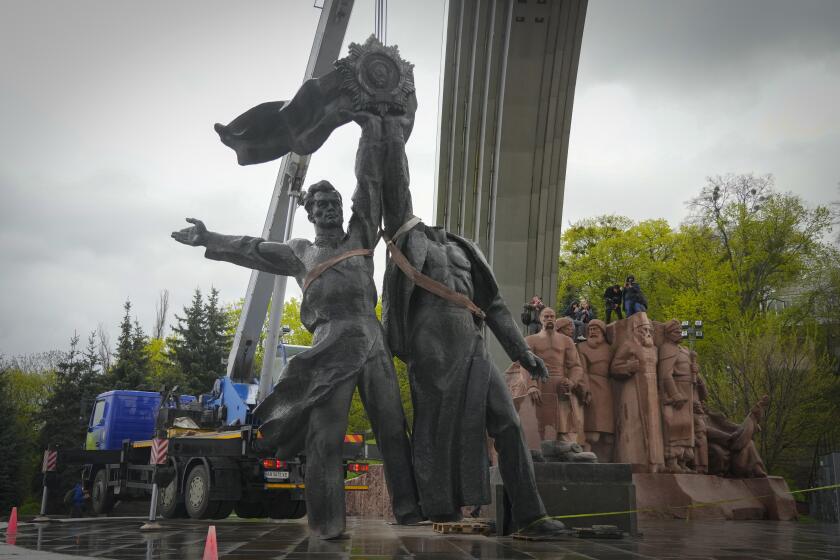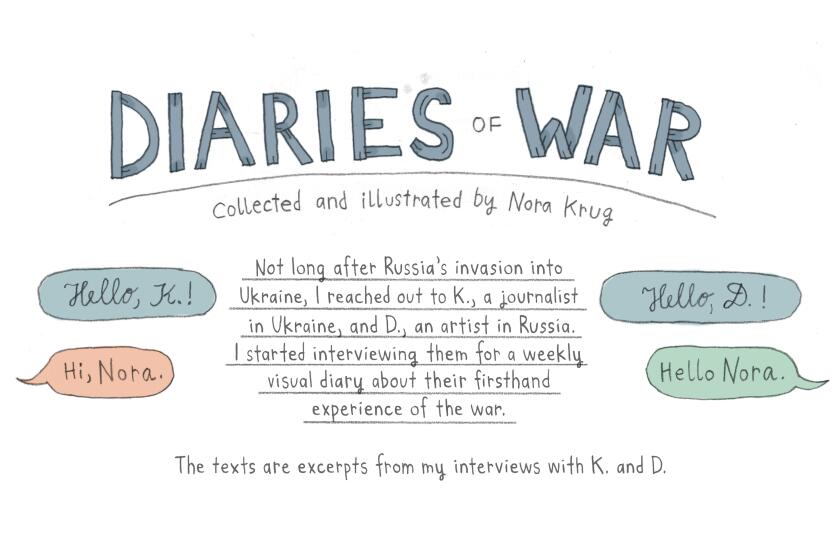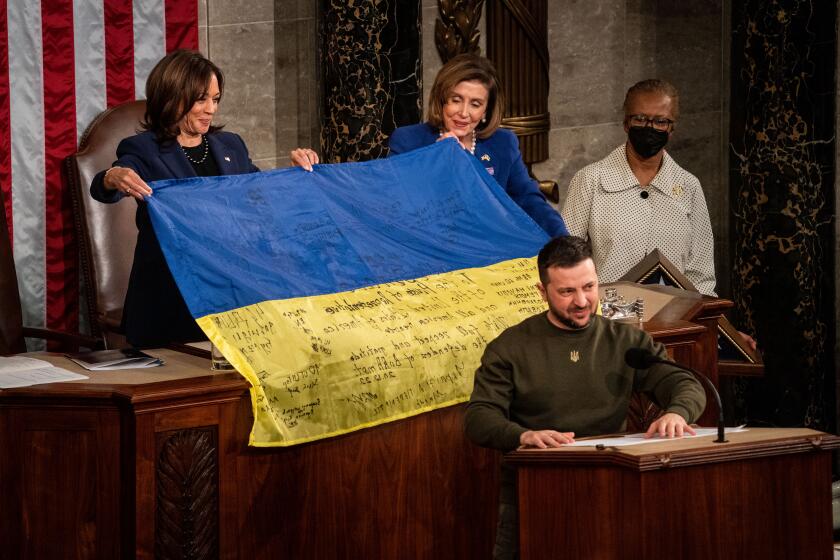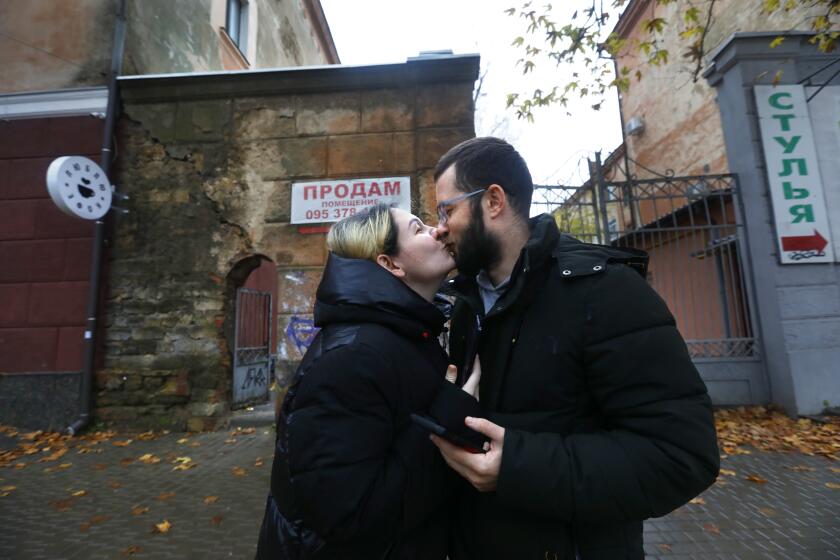Op-Ed: Learn Ukrainian, defeat Russia
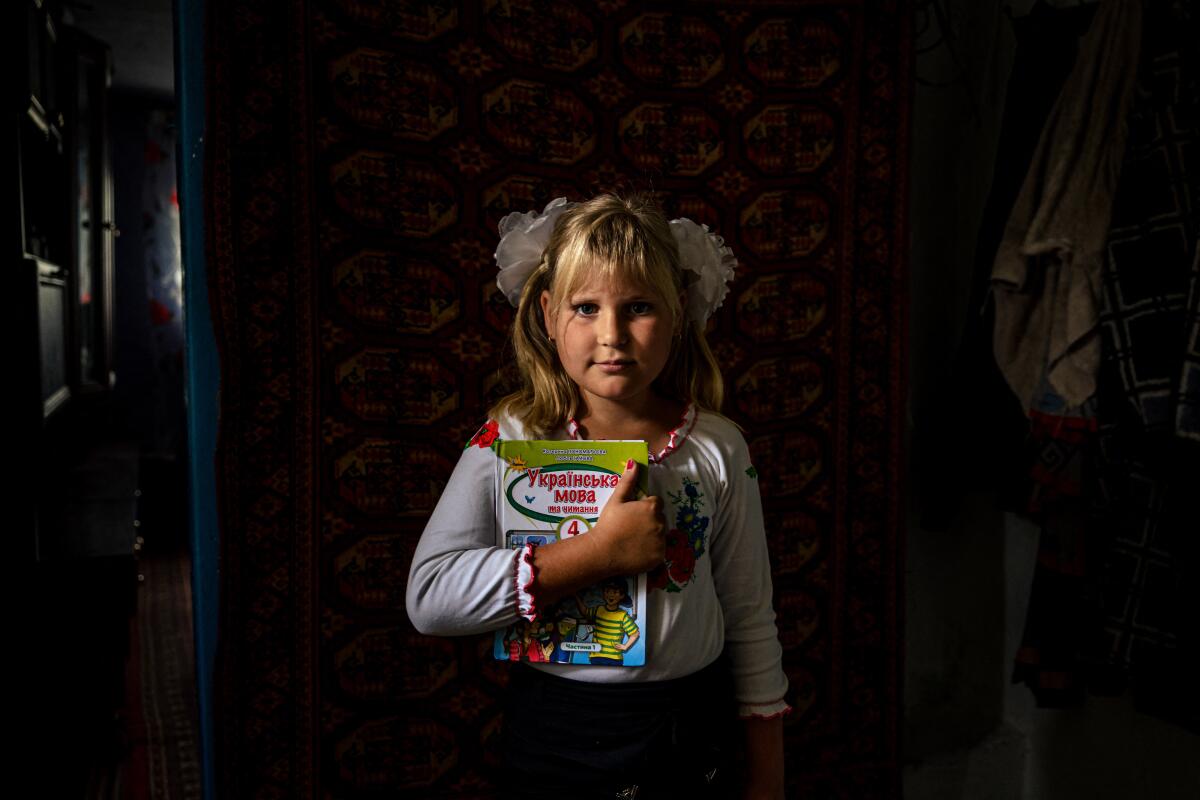
In Chernihiv, northeast of Kyiv, Ukrainian language lessons take place in one of the few intact rooms in the city’s public library, damaged earlier this year when the Russians pummeled the city with missiles. With Ukraine’s utilities under attack, heating is scarce. So on a sub-freezing December day, the students wear winter coats, sipping tea poured from a thermos for additional warmth.
No matter the discomfort, nobody complains. Learning Ukrainian is treated as a patriotic duty for millions of Ukraine’s citizens, another way of contributing to the war effort, especially for older adults, who were educated in Russian under the Soviet system.
“War is not only fought on the battlefield. Language is also a weapon,” is how Ukrainian teacher Olga Petrenko described their motivation.
One of the many idiosyncrasies of this war is that as many as half of all Ukrainians are more fluent in Russian than their own related-but-not-the-same national tongue. This includes most of the population of Kyiv (formerly known by its Russian name, Kiev) as well as Ukraine’s man of the year, President Volodymyr Zelensky (as a popular actor he was also known as Vladimir).
As war rages, streets bearing names of famous Russians strike a discordant note for Ukraine
With the breakup of the Soviet Union in 1991, Ukraine reclaimed its language, which had been repressed since the time of the czars, often with brutality. But transforming the words its citizens actually choose when they talk, write, think and dream — essentially rewiring brains and tongues — has been a slow-moving process.
Now it has taken on new urgency. Russian President Vladimir Putin has fired not only missiles but insults — disparaging Ukraine as merely a region of Russia, its language a dialect. These are fighting words that have spurred many more Ukrainians to learn and use their language.
“People understand there can be nothing in common with the enemy,’’ teacher Petrenko told me.
I traveled to Ukraine recently in a delegation of authors organized by PEN America. We toured damaged cultural centers, monuments and libraries. We met with writers, editors and librarians, and stumbled into the Ukrainian class in Chernihiv.
“Culture is not collateral damage in the war against Ukraine: It’s a target,’’ advised a report released this month by PEN America and its Ukrainian partner.
K. thinks about how the war has affected old friendships. D. considers all that will need to be done by Russia to atone for its attack on Ukraine.
Putin, the report said, seeks “to erase Ukrainian identity and culture, and to impose Russian language, as well as a manipulated, chauvinistic, militaristic version of Russia’s culture, history, and worldview, on Ukrainian people.”
While Zelensky is soliciting military assistance, Ukraine’s culture ministry is making requests to repair damaged theaters, museums and libraries and to replace books, one of the bigger casualties of the war.
The war has forced the closing of more than 2,400 libraries — some damaged, others without heat or personnel. According to the ministry, Russian troops have gone out of their way to destroy Ukrainian-language books, especially textbooks and history — even translated novels by Stephen King (an outspoken advocate for the Ukrainian cause on social media).
Both sides can play the purge game. As part of an ongoing “de-Russification” campaign, statues of Pushkin, Tolstoy and other Russian cultural icons have been removed from public spaces.
The Ukrainian president, on a dangerous trip from his war-torn country, addressed Congress in an attempt to shore up support from his most important ally.
Imports of books from Russia are banned — not only Russian literature but translated books as well. Given that there are an estimated 200 million Russian speakers in the world, compared with at most 40 million Ukrainians, there is a wider variety of books available in Russian translation and at cheaper prices. Even many top Ukrainian authors until recently wrote in Russian, seeking the larger readership.
The Ukrainian Book Institute, established in 2016 by the culture ministry, is trying to compensate by encouraging translations of books into Ukrainian. Not the least of the problems: Most Ukrainian books are printed in the battleground city of Kharkiv.
Writers and translators complain that Ukrainian dictionaries are woefully out of date. Tetiana Savchynska, who has translated books by John le Carre and Kazuo Ishiguro into Ukrainian, told me that she struggles to find words for “privacy,” “commitment” and “resilience” in Ukrainian.
I’ve covered other conflicts that have inspired national groups to switch languages. When the former Yugoslavia split apart, the language once known as Serbo-Croatian disappeared to be replaced by Serbian, Croatian, Bosnian and Macedonian. Tibetans, forced to study in Chinese in school, have told me they discipline themselves to speak their own language by putting money in a jar as punishment if they accidentally spit out a Chinese word.
But Ukraine is an extreme case, a “linguistic laboratory,” as the online publication Ukrainska Pravda puts it.
Amazon is helping Ukraine transfer critical government, business and property data into the company’s data cloud.
Language here is not merely politicized but weaponized: One of Putin’s pretexts for the invasion is the protection of Russian language speakers.
Nobody seems to know how many people in Ukraine speak Ukrainian as their first language, and even the concept of a mother tongue is murky. Ukrainian is the official language of instruction, but it may not be what students speak with their families. Pre-1991, grandmothers spoke Ukrainian, and Russian was imposed by the educational system.
In the last census in 2001, when Ukrainians were asked about their native language, their answers often reflected their patriotism.
“In Kyiv, 76% of the population indicated their native language was Ukrainian, but what they spoke at home was really Russian,’’ said Les Beley, a Ukrainian writer and linguist. “Russian was the language of success.… Ukrainian was the language of folklore and the village.”
Amid the nightmare of war in Ukraine, a coffee date leads to love, cohabitation and a baby girl who’s due in January.
Ukrainian predominates in the west of the country. Russian is spoken mostly in the east and south, especially among the pro-Russian separatists and Russians who relocated to Crimea after the occupation in 2014.
But the lines are not so cleanly drawn and the linguistic divide can run straight through families. It’s common to hear a mishmash of language in a single conversation.
Although the languages are mutually intelligible, switching can be messy. “It took me several years to be able to speak normally, and another five years to master the language at a level that allows me to write fiction,’’ I was told by Ukrainian novelist Volodymyr Rafeyenko, who fled from Russian-speaking Donbas in 2014 after it was occupied by Putin-backed separatists. The difficulty is captured in his recent novel, “Mondegreen,” about a middle-aged writer who suffers a breakdown when changing languages.
Karyna Samokhvalova, a 46-year-old writer from Kharkiv, told us that despite her best efforts to stick to Ukrainian, she still curses in Russian.
“Russian has better swear words. Ukrainian is a peaceful language.”
Barbara Demick is a former Los Angeles Times foreign correspondent. Her most recent book is “Eat the Buddha: Life and Death in a Tibetan Town.”
More to Read
A cure for the common opinion
Get thought-provoking perspectives with our weekly newsletter.
You may occasionally receive promotional content from the Los Angeles Times.
